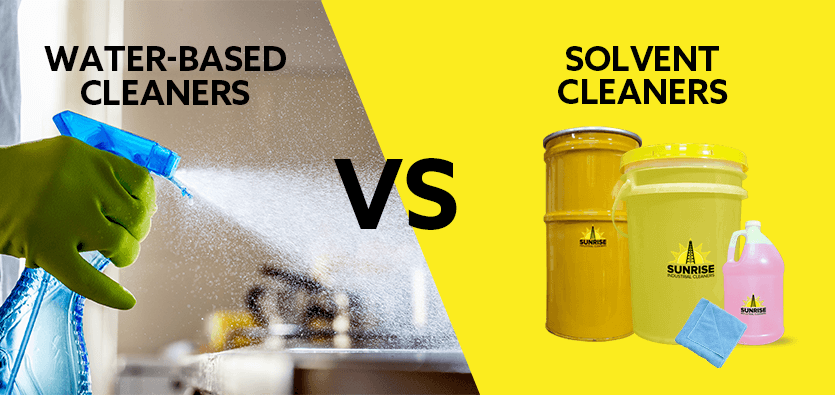
With the ever-growing need for using water-based cleaning chemicals and new solvent solutions, the debate about the use of both types of industrial cleaners keeps on increasing. Organizations that have cleaning needs, including industrial, specification, and precision-driven applications, need to decide which cleaning supplies work best for their business operations and applications.
Solvent-Based Cleaners
All solvents operate by dissolving the soil particles – these solutions break down soil into smaller particles and carry them into the solution and away from the contaminated surface. The majority of solvents offer quick cleaning advantage by dissolving soils and flowing them off of the substrate without requiring extended prep time, processing, or drying time.
Solvent-based cleaners are becoming increasingly popular among various industrial applications because of their enhanced cleaning efficiency – these solutions remove thick oils, dirt, solder flux, and greases in no time. Solvents are generally classified as strong and mild types, and the degree of their strength depends on the level of cleanliness required and the type and amount of soil being removed from a surface.
Evaporation Rates Of Solvent-Based Cleaners
Some solvents are available with evaporation rates that are immediately volatile, while others that only evaporate at increased temperatures. Solvents that evaporate instantly are better suited for use when there’s a need to reduce process downtimes. On the other hand, solvents that evaporate gradually are better suited to increased temperature soak applications.
Surface Tension Of Solvent-Based Cleaners
Overall, solvent-based cleaners offer lower surface tensions than water-based cleaners, which aid in an increased capacity to penetrate tight clearance areas to get rid of soils, without being entrapped.
Water-Based Cleaners
Aqueous cleaners not only eliminate soils by dissolving contaminants, but they also can chemically react with these pollutants, making them increasingly dissolvable in water. The majority of the water-based cleaners consist of a range of other components as well to enhance their effectiveness. Some of these other substances can include detergents or surfactants, builders, emulsifiers, saponifiers, sequestering agents, and chelating agents.
Evaporation Rates Of Water-Based Cleaners
Water-based cleaners operate in a much narrow range of evaporation rates as compared to solvent-based cleaners. While solvents’ evaporation range can vary from immediate to taking months, aqueous cleaners usually have a much narrow range. Typically, water-based cleaners not left to evaporate on their own and can be utilized in a cold or hot soak application.
Surface Tension Of Water-Based Cleaners
Aqueous cleaners have a higher surface tension as compared to solvent-based cleaners. Overall, solvents with lower surface tension are more useful to wet into and come out of small areas and can produce more efficient cleaning results. However, water-based cleaners can also be made to achieve more effective cleaning results, using different tweaks such as increasing the temperature, utilizing various surfactants and emulsifiers, and using spraying and drying mechanisms.
Final Verdict
Both industrial cleaners can be handy in terms of their performance. Nonetheless, much of the cleaning capacity of a specific cleaning chemical depends on nature and quantities of contaminants, the application that’s being cleaned, and the process requirements and constraints.
Sunrise Industrial Cleaners manufactures a variety of high-quality industrial cleaning products. Visit our website to browse through our quality products or contact us for personalized care.
